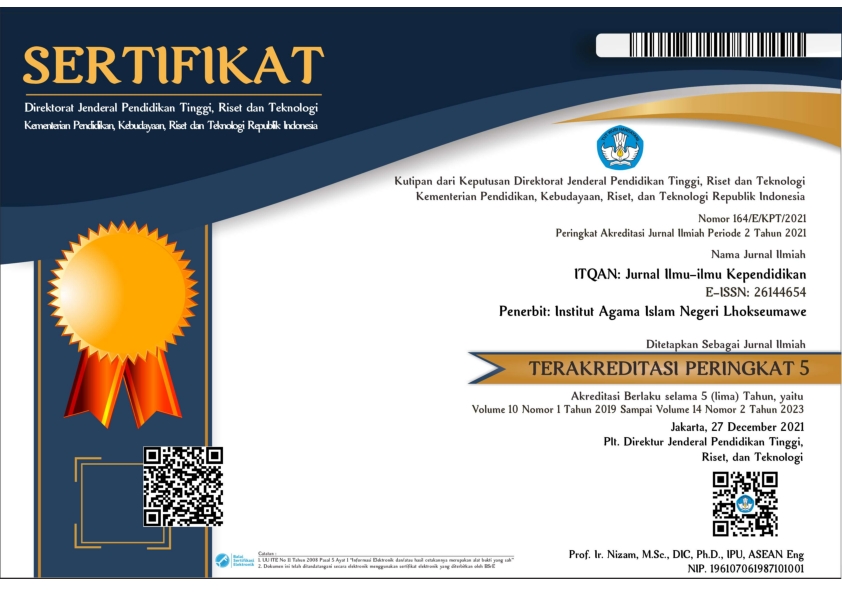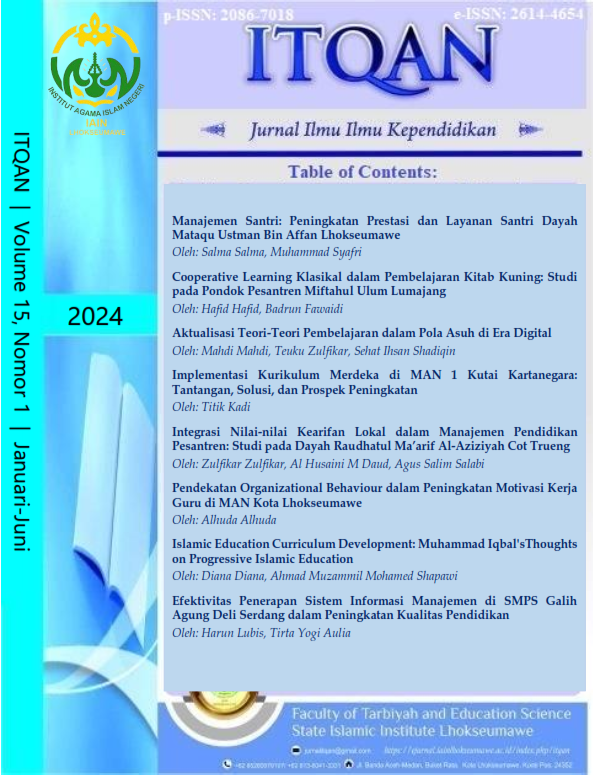Islamic Education Curriculum Development: Muhammad Iqbal's Thoughts on Progressive Islamic Education
Main Article Content
Diana Diana
Ahmad Muzammil Mohamed Shapawi
This research examines Muhammad Iqbal's thoughts on the development of Islamic education curriculum with a focus on the integration of science and religion in contemporary education. The background of this research is the need for curriculum renewal that is relevant to the advancement of modern knowledge and the needs of society. The research method used is descriptive-analytical literature review by collecting and analyzing Iqbal's works and other related literature. The findings of the research show that Iqbal advocated a holistic education, combining Islamic spiritual values with scientific knowledge and humanities to create a comprehensive curriculum that meets the demands of the times. The study suggests that Iqbal's approach can serve as a basis for designing an Islamic education curriculum that produces graduates with balanced intellectual, spiritual, and social skills who are ready to contribute to the development of a dynamic and inclusive society.
Al-Attas, M. N. (1980). The Concept of Education in Islam. Muslim Youth Movement of Malaysia.
Arikunto, S. (2019). Prosedur Penelitian Suatu Pendekatan Praktik. Rineka cipta.
Azra, A. (2006). Islam in the Indonesian World: an Account of Institutional Formation. Mizan Pustaka.
Bungin, B. (2011). Metodologi Penelitian Kualitatif: Aktualisasi Metodologis ke Arah Ragam Varian Kontemporer (Cet. Ke-8). Rajawali Pers.
Fawaidi, B. (2021). Model dan Organisasi Pengembangan Kurikulum. ITQAN: Jurnal Ilmu-Ilmu Kependidikan, 12(1), 33–46. https://doi.org/10.47766/itqan.v12i1.186.
Freire, P. (1970). Pedagogy of the Oppressed. Continuum.
Fullan, M. (2015). The New Meaning of Educational Change. Teachers College Press.
Goleman, D. (1998). Working with Emotional Intelligence. Bantam Books.
Hassan, R. (1985). The Meaning and Role of Intuition in Iqbal’s Philosophy’. Iqbal Review, 26(1), 67–99.
Iqbal, M. (1908). The Development of Metaphysics in Persia: A Contribution to the History of Muslim Philosophy. Luzac & Company.
Iqbal, M. (2013). The Reconstruction of Religious Thought in Islam. Stanford University Press.
Jaya, H., Hambali, M., & Fakhrurrozi, F. (2023). Transformasi Pendidikan: Peran Pendidikan Berkelanjutan dalam Menghadapi Tantangan Abad ke-21. Jurnal Review Pendidikan Dan Pengajaran, 6(4), 2416–2422. https://journal.universitaspahlawan.ac.id/index.php/jrpp/article/view/21907.
Lickona, T. (2019). Pendidikan Karakter: Panduan Lengkap Mendidik Siswa Menjadi Pintar dan Baik. (Terj. Lita S) (2nd ed.). Nusa Media.
Miller, J. P. (2007). The Holistic Curriculum (2nd ed.). University of Toronto Press.
Moleong, L. J. (2018). Metodologi Penelitian Kualitatif. Edisi Revisi. PT Remaja Rosdakarya.
Piaget, J. (1977). The Development of Thought: Equilibration of Cognitive Structures (Trans A. Rosin). Viking.
Rahman, F. (1982). Islam and Modernity: Transformation of an Intellectual Tradition. University of Chicago Press.
Ritonga, A. R. (2016). Memahami Islam Secara Kaffah: Integrasi Ilmu Keagamaan dengan Ilmu-Ilmu Umum. Islam Realitas: Journal of Islamic & Social Studies, 2(2), 118. https://doi.org/10.30983/islam_realitas.v2i2.183.
Salabi, A. S. (2020). Efektivitas dalam Implementasi Kurikulum Sekolah. Education Achievement: Journal of Science and Research. https://doi.org/10.51178/jsr.v1i1.177.
Sholihah, D. A. (2021). Pendidikan Merdeka dalam Perspektif Ki Hadjar Dewantara dan Relevansinya terhadap Merdeka Belajar di Indonesia. LITERASI (Jurnal Ilmu Pendidikan), 12(2), 115. https://doi.org/10.21927/literasi.2021.12(2).115-122.
Sugiyono. (2015). Metode Penelitian Pendidikan Pendekatan Kuantitatif, Kualitatif, dan R&D. Alfabeta.
Tolchah, M. (2015). Filsafat Pendidikan Islam: Konstruksi Tipologis dalam Pengembangan Kurikulum. TSAQAFAH, 11(2), 381. https://doi.org/10.21111/tsaqafah.v11i2.274.




